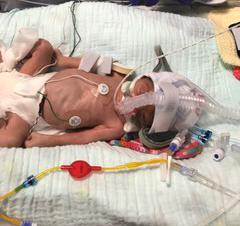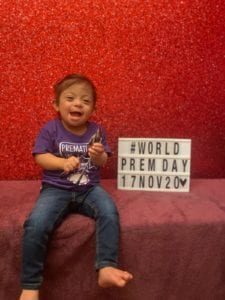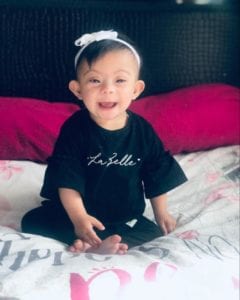Shahnaz and Hibba
My daughter, Hibba, was born at 29 weeks gestation by emergency C-section.
I suffered from placental insufficiency. The blood flow from the placenta was reduced and was not reaching the baby. I was sent to hospital to be monitored and I was admitted into the labour room. After discussions about the baby’s development it was agreed that the best form of action would be to give me 2 doses of antenatal steroids to enhance baby’s lungs as the baby was going to arrive early due to complications.
I was taken to get a scan to check baby’s movements. The doctor was extremely worried about the baby’s development and noticed few things. She said I needed an emergency caesarean, explained what she had noticed on the scan and prepped me for surgery.
I hadn’t slept for 24 hours and I was exhausted. I had an extremely traumatic birth and my baby’s arm was fractured during delivery. Hibba was born floppy and she wasn’t breathing. Doctors carried out 3 cycles of 5 inflation breaths then put Hibba on the ventilator to help her breathe. I did not see Hibba until 15 hours later in NICU. I remember my husband taking me down in a wheel chair. As we entered the room I saw blue lights on the incubator. Hibba was under the light due to jaundice. I started feeling unwell with the hot temperature in the room and I couldn’t breathe and wanted to return to my room where I threw up. I was so overwhelmed by all the machines around my baby that I couldn’t think and didn’t understand what the nurse was telling me. I was in shock, I was tired and exhausted. My body was weak and I just did not have any energy.

Hibba was diagnosed with a heart defect called Atrioventricular septal defect (AVSD) and Patent ductus arteriosus (PDA). These holes in the heart required surgery. Later that week, Hibba was also diagnosed with Down’s Syndrome. She had sepsis and developed a hernia.
It was frightening for us as a family to see Hibba in the incubator with all the wires and machines. When my daughter and son would visit we would have to put on a brave face for them and say, everything will be ok. The kids would call the baby Gem, because originally we were going to name her Jemima Khadija Hibba! Long name I know but we couldn’t decide as we liked them all. But after her diagnosis we decided to call her Hibba (Gift from God). Something simple for her to say and write in the future.
We were so grateful for the staff that looked after Hibba. The nurses went out of their way to make us feel comfortable. It didn’t matter how many questions we asked, the nurses were always happy to answer. My weakness was I got all my information from google! And as many of you know that was one thing you are advised not to do but I just couldn’t help myself!
NICU became a safe haven for me as I spent most of my time there. I was avoiding family so that I wouldn’t have to tell them that I had a baby with Down’s Syndrome. There was so much more going on that I got away with not telling a lot of people. That was the hardest part for me, to come to terms to admit to the outside world. My worst fear that I had a baby with Down’s Syndrome.
The nurses knew that and how I avoided reading certain literature that was given to me. I had accepted the diagnosis and I loved Hibba to the moon and back. But I couldn’t tell anyone or more to the point, I didn’t want to tell anyone. I remember having long conversations about Hibba’s future with some lovely nurses and I really appreciated their time.
While we were in one of the dependency room’s my husband and I met Charlotte from Spoons, she was so lovely. My husband would say “that’s so nice of her to give her time back to the unit” we really appreciated her dedication.
Once we moved to the special care unit (nursery) I met Kirsten from Spoons who would come every week to see how I was. We had lovely conversations. We laughed about life and built a really good relationship. Kirsten would ask me if I’d read our local DS group literature or if I had joined the Spoon’s Facebook page and every time my answer was no!! I just wasn’t ready. Now thinking about it, it all feels really silly but at the time it was the right decision. I was always positive about Hibba and her future. I always drew out the negative. But some people thought that was my denial but it wasn’t. I am the proudest mother to the most beautiful girl.
The one thing I remember while in NICU was seeing one mum in the nursery who was always upset. She also had a baby with Down’s syndrome but I didn’t know at the time. I wish I had approached her at the time, maybe we could have exchanged how we felt about our DS babies. I never got a chance until after we left NICU and we met on a Spoons weaning session a few months later. We became Facebook friends.
The doctors on the unit were remarkable. One in particular sat with us and explained Hibba had a heart defect. She drew us a picture so that we could understand it better. We really appreciated her time and effort. It made us feel at ease with all the anxiety of the unknown and how the surgery might affect her.
Hibba stayed in NICU for 8 weeks. 7 days in Intensive Care. 4 days in High Dependency unit and 45 days in Special Care before she came home early August 2018.
I have some great memories while in NICU. I found talking to my immediate family and professionals had a positive impact on my mental health. It made me strong and better equipped to deal with difficult situations.
A year later I applied to be a Spoons volunteer. I wanted to help and I knew that someone spending a few hours with parent who has been there can make a difference to ones mental health.
I’ve come across a few parents on the unit who felt just like I did. It’s human nature to feel this way and to know that someone will understand how you feel while in NICU makes so much a difference without being judged.
This is my story. Thank you for taking time out and reading my journey in NICU.
Shahnaz


If you have a baby or child with Down’s syndrome you may find the following organisations helpful:
DS West Pennine is a parent led Down’s syndrome support group.
South Manchester Down Syndrome Support Group is a parent led group based in South Manchester.
Down Syndrome Association is a national charity supporting children and adults with Down’s syndrome.